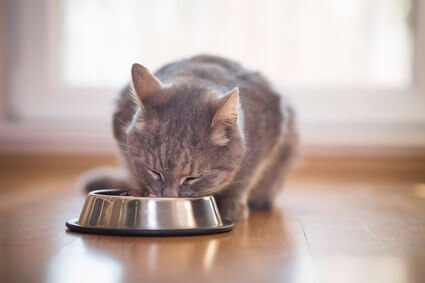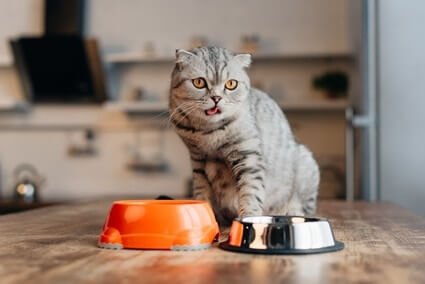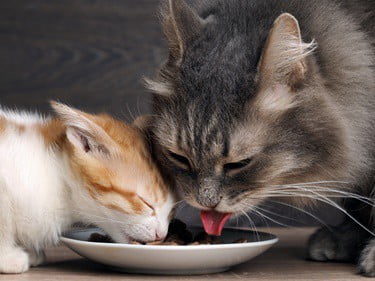Kitten food contains high amounts of fats, proteins, and extra vitamins. After all, kittens are developing their brains, immune systems, and bones. While senior cats have finished their development, they also struggle with the degeneration that age brings. Most cats will thrive on adult cat food, but others will lose their appetite, shed weight, and become vitamin deficient. If so, you may think kitten food is the best option for your older cat.
A senior cat can eat kitten food without getting sick. There are no ingredients that are toxic or harmful to senior cats. In fact, it can be a perfect supplement for underweight cats or those recovering from a serious illness. In the same way that it helps kittens grow, it can enable senior cats to bounce back and overcome nutrient deficiencies. However, you should avoid feeding older cats kitten food exclusively or long-term.
The higher amount of fat and calories may lead to weight gain and obesity. Not all senior cats need extra weight, and vitamins may be wasted on an otherwise healthy cat. Additionally, the salt (sodium) content of kitten food may be bad for senior cats with kidney problems. That makes it smart to treat kitten food as a medicine. Use it in the short term, pair it with normal dry food, and stop if the cat doesn’t appear to need it anymore.
Can Kitten Food Make Older Cats Sick?
As stated, there’s nothing in kitten food that will make healthy older cats ill. They contain similar nutrients, vitamins, and minerals but at different ratios. This means it should not lead to any diseases or health conditions if older cats are fed kitten food for a short period.
The only exceptions are if your cat has a pre-existing condition, such as diabetes or kidney problems. In these situations, owners should consult with a veterinarian before feeding a senior cat kitten food.
Can I Feed My Old Cat Kitten Food?
An older cat can safely eat kitten food. However, you may find that it’s too rich for an older cat to eat long-term.
Kitten food is formulated differently than adult cat food or even specialized senior cat foods on purpose. Older cats, adult cats, and kittens all have their own dietary needs. While all three age groups will eat the same basic food, food brands will adjust the nutrient count to suit each type of cat.
After all, kittens are growing. Adult cats are maintaining their energy levels and metabolism. Older cats are fighting off the degenerative effects of aging. Each will need a little more, or a little less, of each nutrient found in meat products.
It’s not a question of ‘can you feed a senior cat kitten food?’ It’s a question of ‘should you?’ There are times when it’s beneficial to feed a senior cat kitten food. Likewise, there are times when it’s not. To decide if your older cat needs the extra boost found in kitten food, let’s explore how kitten food differs from adult cat foods:

What’s In Kitten Food?
Kittens grow rapidly in the first few weeks of their life. As such, they require special kitten liquid formula during their early development. This formula typically contains 36% crude protein and 40% crude fat. These percentages are meant to mimic the nutrients in their mother’s milk.
Kittens can then switch to eating solid food at 4 weeks of age. This solid food can be dry or canned, depending on your feline’s preferences. Dry kitten food typically contains 35% protein and 12%-24% fat. Canned kitten food has a slightly lower nutritional content, as it is diluted with water.
The fat content in kitten food is relatively high. That’s because kittens need a special fatty acid known as DHA. This helps their brain development and retinal function. Kitten food also contains a higher concentration of certain vitamins and minerals. The main ones are selenium and vitamin E.
These micronutrients contribute to the development of strong immune systems, which help the kitten fight off diseases. Kitten food is also especially high in calcium and phosphorus, as kittens require these to develop and maintain strong bones. To cap it off, it’s even more calorie-dense than adult cat food. This is because kittens have small stomachs but still require a high quantity of calories to grow well.
When you offer a senior cat kitten food, you’re giving it a boost in vitamins, minerals, calories, and fat. This can help it recover from rapid weight loss or a severe illness. However, it can also leave it overweight or make it waste the extra nutrients from an overload of them all at once.
What’s In Adult Cat Food?
Cats should be switched to adult cat food when they reach 80% to 90% of their full size. However, you should avoid going by a cat’s age to determine when it is time to switch. Some breeds, such as Maine coons, reach their full size much later than other breeds.
Once your cat reaches adulthood, you can choose to feed it dry food or wet food, depending on its preferences. Adult cat food is less calorie-dense than kitten food. This is because the cat is no longer growing, and any additional calories will lead to weight gain.
Adult cat food contains 20%-24% fat and 35%-40% protein. This fat content is much lower now, as cats are not rapidly developing their brains any longer. However, adult food may contain certain essential fatty acids to help maintain your feline’s health.
Most senior cats will continue to eat adult cat food unless they develop specific health problems or nutritional deficiencies. At that point, you could speak with your vet and decide if:
- Supplements would be helpful
- A temporary shift to kitten food is necessary
- Your elderly cat needs food specially formulated for its age group
What’s In Senior Cat Food?
Senior cats lose their appetite and begin shedding weight as they grow older. For some, this is a mild transition, and they only need a few extra helpings of adult food to maintain a healthy range. For others, the change is more rapid, and they need supplements, or their appetites drop to dangerous lows. For this reason, you may need to fully adjust your cat’s diet once it reaches 11 years of age.
According to Topics in Companion Animal Medicine, cats tend to lose muscle mass as they age. Therefore, they require high-protein diets to stay healthy. Formulated cat food for seniors will typically have a boost of protein with a low percentage of carbohydrates. This will help their blood sugar levels stabilize properly.
Senior cats with kidney disease require a special phosphorus-restricted diet that limits salt intake. Owners should take this consideration into account when feeding their cat with kidney disease.
There are different senior cat foods available based on your feline’s needs. If browsing through the selection isn’t helpful, you can always consult with your vet.
Is It OK for Senior Cats to Eat Kitten Food?
With all that in mind, you should avoid feeding your senior cat kitten food unless necessary. You can think of kitten food as a supplement or medicine.
It can give your elderly cat the boost it needs to return to normal health. Snacking on it once a week, or every few weeks, will not harm it. However, if the senior cat eats kitten food as a regular meal, its health will take a turn for the worst. It may begin to suffer from weight gain, lethargy and waste the extra nutrients that it’s eating since its body can’t process them all at once.
Kitten food should not be a regular part of the senior cat’s diet unless you are addressing a dietary deficiency. Even then, you may be able to substitute kitten food with some homemade food options.
Likewise, you should pay close attention to your senior cat’s weight and pre-existing health conditions. If your senior cat has a kidney problem, for example, you should avoid feeding it kitten food. The relatively high salt concentrations could lead to their condition getting worse.
Kitten Food for Underweight Senior Cat
The best time to offer an elderly feline kitten food is when it’s underweight. For example, your cat may have recently lost weight due to a serious illness or a sudden reduction in appetite.
In this situation, the high amount of calories packed into kitten food work to your advantage. They accommodate your senior cat’s lack of appetite rather than making sure each bite counts. The higher fat content also helps to pack on weight, while the added vitamins round out any deficiencies your cat experiences.
Owners can start by adding a small portion of kitten food to the older cat’s diet a few times a week. Avoid feeding it kitten food exclusively, though. The high amounts of fat could make the food too rich, leading to diarrhea.
Senior Cat Will Only Eat Kitten Food
Some cats are notoriously picky eaters. You can offer various types of dry and wet foods, only for them to reject most of the options. In fact, many owners report their senior cats only accepting kitten food. This is usually because:
The Cat Has An Unmet Dietary Need
A senior cat may require a specialized diet, depending on its unique circumstances. If your cat feels it isn’t getting adequate nutrition from its regular diet, its body may start to crave the type of nutrients found in kitten food. In this situation, it will steal food from your kitten’s bowl or even start eating weird human food.
It Misses the Taste of Kitten Food
It’s not uncommon for cats to steal food from each other’s bowls. If your older cat had a chance to share a dish with your new kitten, it will remember the taste fondly and seek it out. Owners should monitor this situation closely and remove kitten food from the older cat’s reach if this is the case.
It Prefers A Certain Type Of Food
Cat food can generally be classified as dry or wet. Dry cat food contains 10% water alongside 90% fat, carbohydrates, and other nutrients. On the other hand, canned food contains up to 70% water, hence the name “wet food.”
Most kitten food brands are wet. This will help your baby cat stay hydrated, and it treats their smaller, younger teeth more kindly. With wet food suddenly in the house, your older cat may be interested in stealing it. This is especially true if it has dental problems and has difficulty chewing and swallowing dry food.
How Long Can a Cat Eat Kitten Food?
If you’ve begun feeding your senior cat kitten food just recently, there is no set criterion for when you should stop. Instead, owners should monitor their cats’ health and see if any problems arise from the kitten food intake. If you spot any of these signs, consider switching it back to a regular adult diet.
Exacerbated Medical Condition
If your senior cat has a medical condition such as kidney or stomach problems, you should check if its symptoms are getting worse. This includes problems such as:
- Dehydration
- Frequent urination
- Irregular bowel movements
Excessive Weight Gain
If you would like your senior cat to gain weight through a kitten food diet, you should ensure it doesn’t go overboard. The high calorie content may lead to your cat packing on unnecessary weight. This is not only unhealthy but can be painful for older cats.
Senior cats often have joint conditions such as arthritis. This can make it painful for their limbs to support their body weight. While the boost of vitamins may help ease the discomfort at first, the resulting weight can make the problem worse.
You can check if your senior cat is overweight by running your hands along its spine and feeling for the bones underneath. If you can’t feel the bones through the layer of fat easily, your cat may be overweight. You should switch back to a normal diet.

How to Keep Cat Away From Kitten Food
If your senior cat won’t stop eating your kitten’s food, there are steps you can take. Instead of letting your older cat gorge itself or leaving the kitten hungry, you can:
Ensure Your Senior Cat’s Dietary Needs Are Met
If the senior cat feels its dietary needs are met, it won’t go around scavenging for more. You can take the cat to your vet for a checkup and ask if it’s a healthy weight for its size and age. If your cat is underweight, you should consider giving it more adult food.
If your cat is already obese, it may simply have a craving for additional food. You should try switching up the cat’s diet with less fattening options if this is the case.
Separate Feeding Times
If your senior cat is unable to access the kitten food, it can’t eat it. Try feeding your kitten at a different time than your older cat. You can also separate the two into different rooms while they eat. As a plus, this will discourage any food guarding and limit possible conflicts between the two.
Remove Kitten Food From Your Home
If your kitten is old enough, you may not need to keep feeding it kitten food. This will be around 10 months of age or even as far back as 8 months. You can start feeding the younger cat adult food, which should discourage your senior cat from eating out of the kitten’s bowl.
Homemade Food
If your feline craves more protein, water, or flavor, then homemade food can do the trick. You can make your own dishes by combining cooked turkey, fish, or dark-meat chicken. This also helps you ration the calorie count and the amount of vitamins your feline is taking in.
Even still, you should feed your senior cat a combination of homemade food and dry cat food. The latter can help remove plaque and keep its teeth healthy.
All in all, senior cats can safely eat kitten food. So long as it’s used medicinally to help the cat overcome a health issue, it won’t disrupt the body’s natural balance. However, if it’s given long-term, and your cat doesn’t need the extra boost, it can be harmful.

